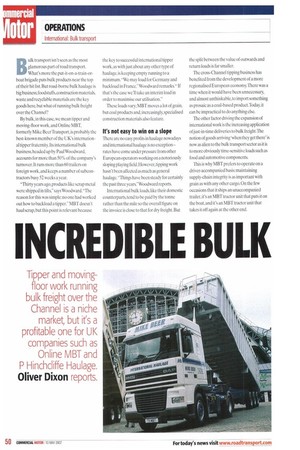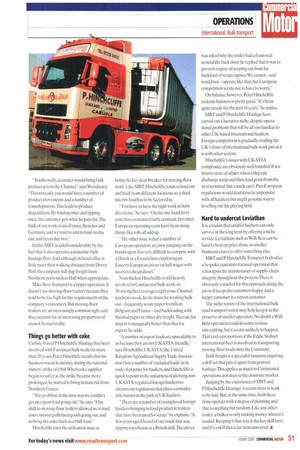NCREDIBLE BULK
Page 50

Page 51

If you've noticed an error in this article please click here to report it so we can fix it.
Bulk transport isn't seen as the most glamorous part of road transport. What's more the put-i t-on-a-train-orboat brigade puts bulk products near the top of their hit list. But road-borne bulk haulage is big business;foodstuffs,construction materials, waste and recyclable materials are the key goods here, hut what of running bulk freight over the Channel?
By bulk, in this case, we mean tipper and moving-floor work, and Online MBT, formerly Mike Beer Transport, is probably the hest-known member of the UK's international tipper fraternity. Its international bulk business, headed up by Paul Woodward, accounts for more than 50% of the company's turnover. It runs more than 60 trailers on foreign work, and keeps a number of subcontractors busy 52 weeks a year.
"Thirty years ago, products like scrap metal were shipped in tilts," says Woodward."The reason for this was simple: no one had worked out how to backload a tipper." MBT doesn't haul scrap, but this point is relevant because the key to successful international tipper work, as with just about any other type of haulage, is keeping empty running to a minimum." We may load for Germany and backload in France,Woodward remarks." if that's the case we'll take an interim load in order to maximise our utilisation."
These loads vary; MBT moves a lot of grain. but coal products and, increasingly, specialised construction materials also feature.
It's not easy to win on a slope
There are no easy profits in haulage nowadays and international haulage is no exception — rates have come under pressure from other European operators working on a notoriously sloping playing field. However, tipping work hasn't been affected as much as general haulage. "Things have been steady for certainly the past three years,-Woodward reports.
International bulk loads, like their domestic counterparts, tend lobe paid by the tonne rather than the mile so the overall figure on the invoice is close to that for dry freight. But the split between the value of outwards and return loads is far smaller.
The cross-Channel tipping business has benefited from the development of a more regionalised European economy There was a time when it would have been unnecessary, and almost unthinkable, to import something as prosaic as a coal-based product.Today, it can be impractical to do anything else.
The other factor driving the expansion of international work is the increasing application ofjust-in-time deliveries to bulk freight,The notion of goods arriving when they get there' is now as alien to the hulk transport sector as it is to more obviously time-sensitive loads such as food and automotive components.
This is why MBT prefers to operate on a driver-accompanied basis: maintaining supply-chain integrity is as important with grain as with any other cargo. On the few occasions that it ships an unaccompanied trailer, it's an MBT tractor unit that puts it on the boat, and it's an MBT tractor unit that takes it off again at the other end. fraditionally, a coaster would bring bulk product across the Channel," says Woodward. "Theoretically you would have a number of product movements and a number of transshipments. This leads to product degradation.By loading once and tipping once, the customer gets what he pays for.The bulk of our work is into France. Benelux and Germany, and we tend to aim to load on day one and tip on day two," In this. MBT is aided considerably by the fact that it also operates a domestic bulk haulage fleet. And although its head office is little more then walking distance from Dover Port, the company will ship freight from Northern ports such as Hull when appropriate.
Mike Beer Transport is a tipper operation. It doesn't use moving-floor trailers because they tend to be too high for the requirements of the company's customers. But moving-floor trailers are an increasingly common sight, and they account for an increasing proportion of cross-Channel traffic.
Things go better with coke
Carlisle-based P Hinchcliffe Haulage has been involved with European bulk work for more than 20 years. Peter Hinchliffe recalls that his business was in its infancy during the national miners' strike of 1984. When coke supplies began to suffer as the strike became more prolonged, he started to bring in material from Northern France.
"The problem at the time was we couldn't get an export load going out," he says. "Our shift to moving-floor trailers allowed us to load conventional palletised goods going out, and to bring the coke back as a bulk load."
Hinchcliffe cites the utilisation issue as being the key deal-breaker for moving-floor work. Like MBT. Hinchcliffe tends to load out and back from different locations, so a third interim load has to be factored in.
"You have to have the right work in both directions," he says. "On the one hand ferry costs have remained fairly constant, but other European operating costs have been rising; things like tolls all add up.
lhe other issue is that a number of European operators are now jumping on the bandwagon. It is very difficult to compete with a Dutch or a French firm employing an Eastern European driver on half wages with access to cheap diesel."
Nonetheless Hinchcliffe is still heavily involved in Continental bulk work:its 30-strong fleet averages eight cross-Channel loads per week. In the main, he is taking bulk out — frequently waste paper to mills in Belgium and France— and backloading with finished paper or other dry freight.The rate for import is marginally better than that for export, he adds.
"A number of export loads are unavailable to us because they are not IJKASTA-friendly," says Hinchcliffe.UKASTA (the United Kingdom Agricultural SupplyTrade Associadon) lists a number of 'excluded loads' in its code of practice for hauliers, and Hinchcliffe is quick to point to the unfairness of allowing nonUKASTA-regulated foreign hauliers to circumvent regulations that place a considerable barrier in the path of UK hauliers.
—There are a number of examples of foreign hauliers bringing in food product in trailers that have been used for scrap," he explains."A few years ago, I heard of one truck that was tipping soya beans at a British mill.The driver was asked why the trailer had a foam seal around the back door; he replied that it was to prevent engine oil seeping out from his backload of scrap engines. We cannot— and would not —operate like that, but European competition seems not to have to worry."
On balance, however, Peter Hinchcliffe reckons business is pretty good."It's been quite steady for the past 18 years," he smiles.
MBT and P Hinchcliffe Haulage have carved out a lucrative niche, despite operational problems that will be all too familiar to other UK-based international hauliers. Foreign competition is gradually eroding the UK's share of international bulk work just as it is with other sectors.
Hinchcliffe's issues with UKASTA compliance are obviously well founded. It is a bizarre state of affairs when a ship can discharge scrap and then load grain from the next terminal, but a truck can't. Pan-European regulations would doubtless be unpopular with all hauliers, but might go some way to levelling out the playing field.
Hard to undercut Leviathan
It is a truism that smaller hauliers can only survive in the long term by offering a niche service. Leviathans such as Willi Betz can be hard to beat on price al one. so smaller businesses have to offer something else.
MBT and P Hinchcliffe Transport both offer a bespoke, customer-focused operation that relies upon the maintenance of supply-chain integrity throughout the process.There is obviously a market for this approach; doing the job well keeps the customers happy, and a happy customer is a repeat customer.
The niche nature of the international bulk road transport sector may help keep it as the preserve of smaller operators. No doubt a Willi Betz operation could do some serious rate-cutting, but it seems unlikely to happen. That said, a proportion of the Eddie Stobart international fleet is involved in transporting moving-floor loads onto the Continent.
Bulk freight is a specialist business, requiring a skill set that puts it apart from general haul age.This applies as much to Continental operations as it does to the domestic market.
Judging by the experience of MBT and P Hinchcliffe Haulage, it seems there is work to be had. But, at the same time,both these arms operate with a degree of planning and that is anything but random. Like any other trailer, a bulker is only making money when it's loaded. Keeping it that way is the key skill here, and it's a skill that is far from universal. •






















































































































































































